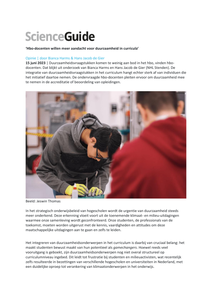Rond 40% van de mbo-studenten van niveau 4 kiest na diplomering voor doorstuderen in het hbo. Een overgang die voor menigeen problemen oplevert. Het percentage uitvallers in het eerste jaar is aanzienlijk. Hoe komt dat, waar liggen de struikelblokken en: wat te doen om die transitie soepeler te laten verlopen? Zijn mbo’ers wel ‘weerbaar en wendbaar’ genoeg voor het hbo?
DOCUMENT

Internationalisation has become an “institutional imperative” for many institutions of higher education. Two propositions are that internationalisation would help students develop competencies needed in todays globalised world, and increase the employability of students. This piece summarises findings from the HBO-Monitor (a survey amongst alumni of Dutch universities of applied sciences) to substantiate the aforementioned propositions. The analysis suggests that internationalisation measures such as a foreign experience are conducive to the acquisition of international competencies. By contrast, little support derives from the HBO dataset concerning the link between internationalisation (or the thereby acquired competencies) and an increase in employability. However, a good number of alumni confirm that international competencies are needed in their current jobs. Based on this project, the Research Group International Cooperation will set up a longitudinal study on internationalisation at THUAS and its impacts.
DOCUMENT

In dit artikel wordt het belang aangegeven van onderzoeksvaardigheden in het HBO. Met de komst van de lectoraten en de nieuwe positionering van het HBO is het belangrijk om een antwoord te vinden hoe het onderzoek binnen het HBO vormgegeven moet worden. Hierbij wordt gekeken naar de bruikbaarheid van verschillende onderzoeksmethoden en naar rollen die een student binnen een curriculum in het onderzoek kan hebben
DOCUMENT
In dit artikel wordt het belang aangegeven van onderzoeksvaardigheden in het HBO. Met de komst van de lectoraten en de nieuwe positionering van het HBO is het belangrijk om een antwoord te vinden hoe het onderzoek binnen het HBO vormgegeven moet worden. Hierbij wordt gekeken naar de bruikbaarheid van verschillende onderzoeksmethoden en naar rollen die een student binnen een curriculum in het onderzoek kan hebben.
DOCUMENT

Voor het begeleiden van studenten met psychische beperkingen bestaat geen standaardprocedé. Iedere student is uniek en brengt zijn eigen mogelijkheden en belemmeringen met zich mee. Dit geldt zeker voor jongeren met een bipolaire stoornis. In dit artikel formuleert HBO-docent Helmut Boeijen, mede op basis van zijn eigen ervaringen met een bipolaire student, handvatten voor hun begeleiding.
DOCUMENT

Artikel van Rob Kayzel, onderwijskundige bij de HvA, in het tijdschrift Onderzoek van Onderwijs, over het onderzoek naar opvattingen van docenten binnen de HvA dat hij heeft uitgevoerd binnen de Kenniskring Leren & Innoveren. Centraal stonden twee vragen: Wat zijn de opvattingen van docenten in het hbo? Hoe veranderen die opvattingen? Het onderzoek laat tevens zien dat opvattingen van docenten gevormd worden door interactie; interactie met studenten, met collega’s maar ook met zichzelf, op basis van reflectie op eigen ervaringen. Die interactie is niet alleen de motor voor vernieuwingsprocessen zelf, maar ook voor het plezier dat docenten ontlenen aan die vernieuwingen in hun onderwijs
DOCUMENT

Voor studenten die de overstap maken naar het hbo is soms onvoldoende duidelijk welke rol er van hen als student verwacht wordt. In dit onderzoek wordt de hbo-studentenrol verkend door gedragingen en strategieën te identificeren die hbo-studenten moeten beheersen en tonen om succesvol te kunnen studeren. De rolopvattingen van studenten en docenten worden in kaart gebracht, alsmede hun visie op de wijze waarop studenten geholpen kunnen worden om hun weg te vinden in het hbo, de ondersteuning die daarbij nodig is en de vraag hoe, wanneer en door wie die ondersteuning geleverd zou moeten worden. Het onderzoek beoogt daarmee bij te dragen aan de ontwikkeling van praktijken die studenten ondersteunen in het vinden van hun rol in het hbo.
DOCUMENT

Gouden tip: stem je dienstverlening af op de vraag van cliënten. Open deur? Nee, het gebeurt te weinig, zegt lector Toegankelijkheid van het recht bij Hogeschool InHolland, Ineke van den Berg. Met haar Basisboek Legal Design traint ze HBO-juristen in het toegankelijk maken van juridische diensten.
LINK
Kort artikel over duurzaamheidsvraagstukken in het HBO
MULTIFILE

Lectoraten van Hogeschool Utrecht, Hogeschool van Amsterdam en Fontys Hogeschool sloegen, in opdracht van Zestor, de handen ineen om onderzoek te doen naar de professionele ontwikkeling van hbo-docenten in teamverband. De praktijkkwestie die het vertrekpunt voor het onderzoek vormt, is: Hoe kunnen docententeams gezamenlijk leren om hun vakbekwaamheid en professionele identiteit te versterken?
DOCUMENT
